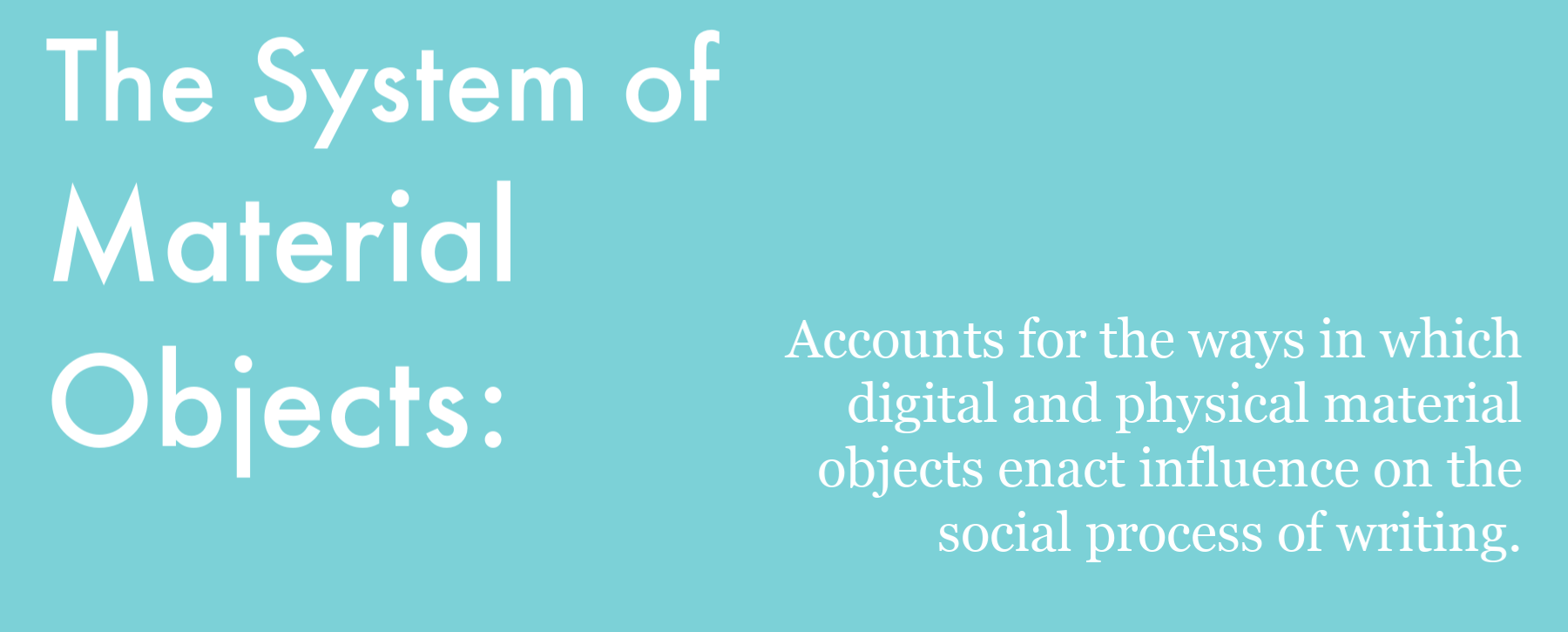Defending the Inclusion of Materials:
An updated framework must include a System of Materials
This project's System of Materials is informed by some of Bruno Latour's work in Actor-Network-Theory (ANT). In "Third Source of Uncertainty: Objects too Have Agency," Latour revisits ANT's perspective on the object's role. This theory, according to Latour, is
"not the empty claim that objects do things 'instead' of human actors: it simply says that no science of the social can even begin if the question of who and what participates in the action is not first of all thoroughly explored, even though it might mean letting elements in which, for lack of a better term, we would call non-humans." (72)
The claim that materials enact influence on action (like that found in a writing ecology) on the writing process is not a new one. Numerous scholars have maintained that writing is both social and material (Micciche, Syverson, Cooper, Dobrin, Brooke). Margaret Syverson argues that "Texts emerge through writers' and readers' physical interactions with material structures: pens, paper, computers, typewriters. Texts take physical form as print on paper in books, journals, log books, and illuminated electrons on the screens of computers" (Syverson 18). It is impossible to examine a digital writing ecology without affording significant attention to user interfaces, CPU builds, and other resources that support the composition of Simming content. These materials are a primary influence on the social process of Simming's content creation.
While a system exploring material objects is not included in Marilyn Cooper's original framework, her description of important system traits justifies material objects' place within this project: "they are inherently dynamic; though their structures and contents can be specified at a given moment, in real time they are constantly changing...Furthermore, the systems are concrete. They...can be investigated, described, altered; they are not postulated mental entities, not generalizations" (7). Therefore, incorporated systems must be both dynamic through time but tangible and able to be investigated in given moments. The material objects--such as computer builds and platform interfaces--in the Simming composing ecology, then, are an excellent example of the system at work because they exert tangible difference in the course of composition, they dynamically change over time, and we can observe this agency in case studies.
Additionally, some scholars have critiqued "The Ecology of Writing" for its lack of incorporation of material and embodied influences (Dobrin, Syverson, Cooper). In an updated edition of her original article, Cooper herself acknowledges that the original framework was not perfect, arguing that it should be viewed as a "heuristic, not as a taxonomy in any sense" ("The Ecology of Writing" 2). While critiquing Cooper's model, Margaret Syverson says, "there has been surprisingly little attention directed to the physical, material circumstances of writing" (The Wealth of Reality 25). While I don't necessarily agree with Syverson's critique in full, the influences she speaks of here become even more important when approaching a composing site like the Simming ecology. In the Simming community, the physical, material circumstances of writing or "content creation" can enable or gatekeep the production of writing and negotiation of power. Therefore, it is important for scholars to examine these influences in their own system.
Therefore, to adapt Cooper's model to the Simming Ecology, I account for the presence of material agency and influence, as well as the increasing complexity with which digitally-based relationships are negotiated. In doing so, I attempt to sew new pages into Cooper's older binding to produce a framework that is both recognizable and salient within the field of Writing Studies but also suited to address new sites of writing, such as the Simming ecology.
When discussing the system of materials' components in the Simming Ecology, I draw from Latour's argument of object agency as well as Brooke's advocacy for interfaces as integral components to writing production. Latour argues that objects or materials extend influence into action and advocates for framing objects "as visible, distributed, accounted mediators before becoming invisible, asocial intermediaries" (Latour 80). To do so requires us to not take the materials' mediations for granted. Additionally, I do not limit materials to the physical; in this project, I consider digital interfaces to also be a kind of material.
Scholars such as Collin Gifford Brooke claim that Composition Studies is not well adapted to online writing practices and processes because the field's traditional emphasis on text as the product fails to account for the "ongoing process at the level of interface" (25). Our very notions of text as product can distort the ways in which we understand content creation, which is always ongoing and mediated by interface. Accounting for interface, therefore, is a necessary feature of an adapted ecological framework.

